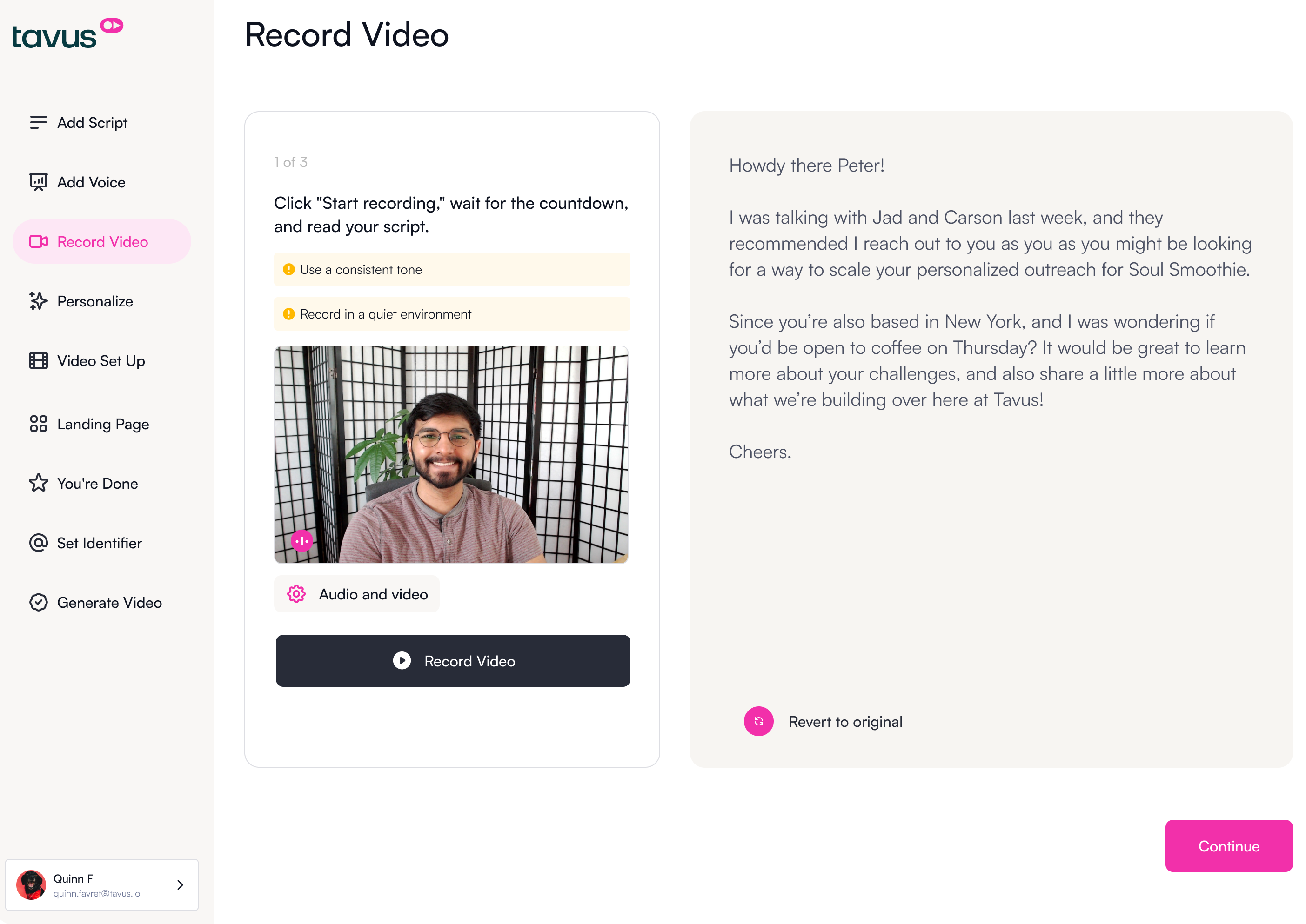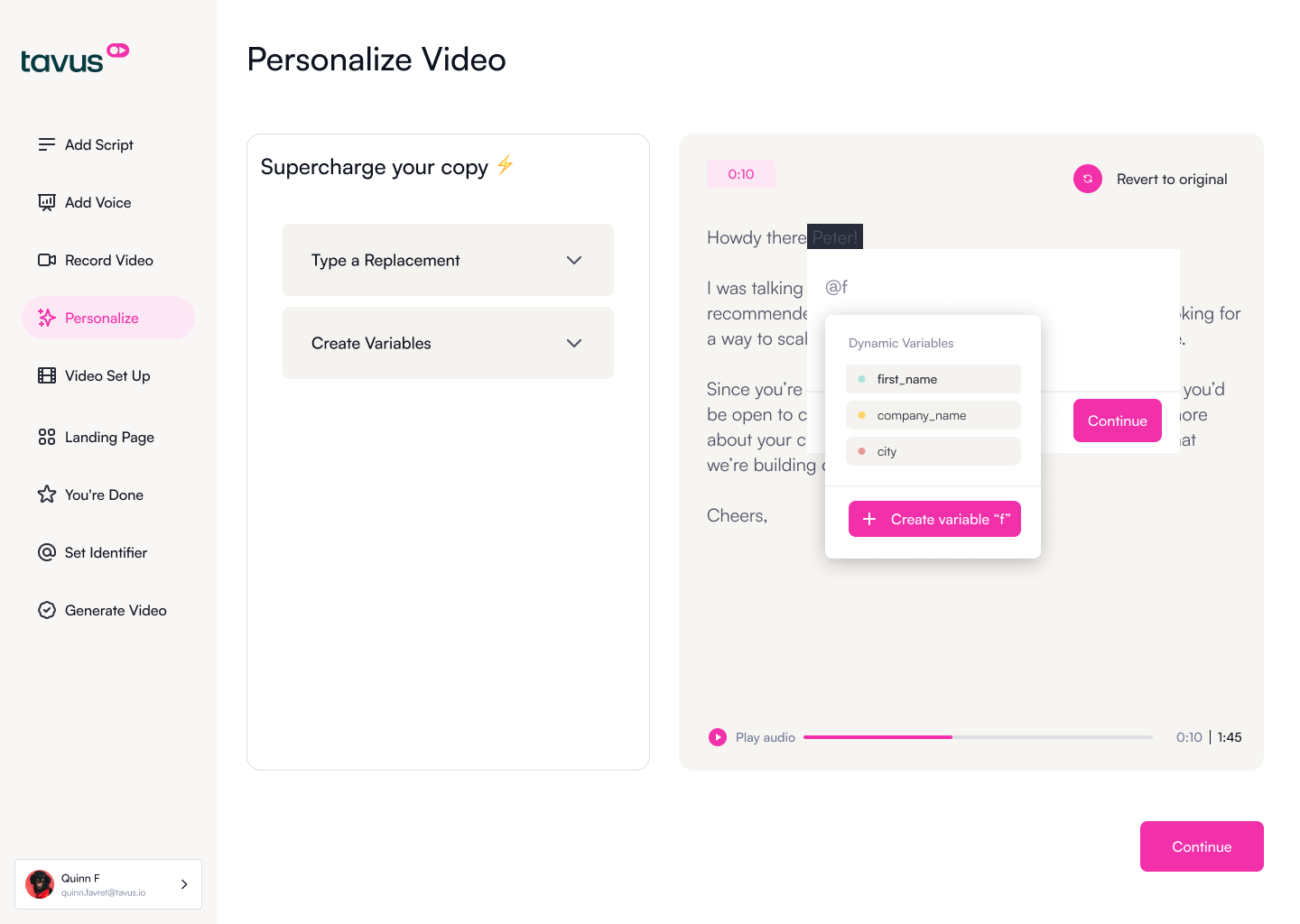Generative AI is already looking to be the main tech trend of 2023. The ability to generate new content via algorithms has been pushed into the public consciousness by, among others, ChatGPT, a chatbot-style technology trained on large language models (LLMs) built in be able to write essays, poems, song lyrics, news articles and even computer programs. And then there’s DALL-E, from the same Microsoft-backed OpenAI that spawned ChatGPT, which serves a similar purpose, but for visual creations instead.
While some have claimed that ChatGPT signals AI’s coming to the mainstreamthe truth is, we’re just at the dawn of a new era of AI-powered applications that will transform just about every facet of the industry – from consumer search and stock photography to real estate and content marketing.
And it’s against that background that a budding startup called Tavus aims to make its mark by enabling companies to create “unique” videos tailored to a specific individual, but based entirely on a single first shot.
The idea is that a sales and marketing team, for example, could deliver an endless stream of video pitches to prospects, perhaps based on textual data submitted by the prospect through an online form. Or maybe a headhunter uses the platform to send multiple personalized videos to potential candidates using data from their LinkedIn profiles.
Founded in San Francisco in 2020 by CEO Hassaan Raza and Quinn Favret, Y Combinator (YC) alum Tavus announced today that it has raised $6.1 million in a seed round led by Silicon Valley investor Sequoia, with participation from a slew of high-profile lenders, including Accel Partners, Index Ventures, Lightspeed Ventures and YC Continuity.
How it works
Any company that wants to create multiple personalized videos knows that it’s an incredibly time-consuming, repetitive process: recording the same message, with the same content, but adapted for different clients or candidates. And that’s what Tavus aims to address, allowing users to create their own AI video templates in minutes and then generate unlimited versions of a video from that original source.
The initial onboarding process requires the user, e.g. a recruiter or sales manager, to record a 15 minute video based on a script from Tavus, which is used to train the AI. Then the user registers a template for each campaign they want to create.

Tavus: Reading a script to create a basic template Image credits: Tavus
Using a web-based editor, users can then select which elements of the video to personalize, specify each variable (e.g., company, executive name, or location), add calls to action, and so on.

Tavus: Personalizing script with variables Image credits: Tavus
Tavus also supports longer variables via ChatGPT powered snippets for more personalized introductions, something Favret says is in high demand among its users. For example, the basic script on which a video is created can be configured to include a one-sentence introduction generated from a specific individual’s LinkedIn profile.

Tavus: generate personalized content Image credits: Tavus
Essentially, Tavus aims to replicate what mass marketing software has been doing for years in the email world, bringing it into the more visually appealing world of videos. In reality, this may raise some red flags for some – will people be so receptive to a personal sales pitch if they discover that the sender didn’t do it? Real bothered to make a video just for them? But more than that, there might be something creepy about an AI-generated video that uses personal information from a database, meaning something designed to personal could end up looking incredible impersonal when the user learns how it was made.
Questions raised by such scenarios will persist as AI becomes more ingrained in our daily lives. And Favret is quick to emphasize that sales and marketing are obvious use cases for his technology, but are not pure about those industries: It’s being adopted by “an eclectic group of users,” including recruiters, college deans, and C-level executives.
“There is a common misconception that Tavus only works with sales and marketing teams,” says Favret. “While this is a focus of ours, we have users applying Tavus in innovative and powerful ways throughout the entire customer journey. Many of our experienced users are adopting Tavus broadly across their organizations, including for customer success, products, recruiting and other go-to-market related functions.”
And WHO exactly, pushing themselves forward for cloning?
“Usually the user clones themselves, but it is also common for companies to have a central figure – such as an executive or spokesperson – record the videos to have a consistent face of the company,” added Favret. “Tavus is designed for all types of users to easily clone themselves in minutes.”
Under the hood, Tavus says it uses machine learning to train a model on facial gestures and lip movements, creating a system that realistically mimics these movements in sync with synthesized audio.
In terms of implementation, companies can access Tavus in two ways. Half of the users do this via the web dashboard, while the others integrate or natively integrate Tavus into their own systems via API.
“We often see sales teams using and deploying Tavus directly through the platform because they can efficiently generate large volumes of videos for campaigns they have planned,” said Favret. “Other teams will use Tavus in a more programmatic way, integrating it directly into their systems. This allows users to create ‘event-driven’ workflows in which a Tavus video can be generated and sent after a trigger.
As an “event-driven” example, if a sales prospect submitted a form on a company’s website, the company could automatically generate and send a custom Tavus video to that lead using data that the prospect enters themselves.
“This allows businesses to take advantage of appropriate timing for maximum conversions, without having to wait for a team member to record the video,” Favret continued.
Abuse
At the high end of the generative AI spectrum, we see the likes of Microsoft and Google scrambling to see who can get their respective smarts into the hands of businesses and consumers the fastest, a battle Microsoft seems to be winning by the gift. At the same time, we are seeing a slew of generative AI startups emerge, such as GlossAi, which uses AI to help companies create easily shareable marketing sketches, while Typeface is doing something similar for marketing copy and image generation. in the enterprise.
Specifically for Tavus, there have been similar companies such as Windsor, which does something similar, albeit with a heavy focus on e-commerce. And then there’s the London-based Synthesis backed by a slew of high-profile investors, which is more about creating digital avatars from text for use in training and how-to videos. Additionally, FlexClip is another notable player in the online video editing space, offering intuitive AI tools for creating and editing videos.
So it’s clear that even before all the generative AI hype of the past few months, there was a growing movement in that direction from the startup world, something Tavus now wants to capitalize on. Indeed, in his short life so far, Tavus has already amassed some rather large clients, such as a real estate data company Co-star and the French tech scale-up AB Tasty.
However, it is worth considering the potential misuse of this type of technology. For example, is there anything that prevents someone from uploading a video of someone else speaking, and then creating new videos based on that template? Certainly, there is no shortage of examples of deepfake hoaxes from across the video and voice spectrum. And some companies, like the South Park creators startup Deep Voodoo – are already raising VC money for their deepfake efforts. As this kind of technology becomes established and normalized in society, more questions will arise about the ethical implications of it all – even if the underlying intentions are well-intentioned.
According to Favret, Tavus has a built-in feature that makes it harder to fool the system, requiring users to perform a voice verification and record live on the Tavus platform.
“This means users can’t upload videos of others talking,” Favret said. “In addition, users have all rights to their data and likeness, allowing them to remove or delete their videos at any time. We’re also very mindful of how Tavus is used — we screen every use case before a user starts using Tavus, and make sure the use case meets our community guidelines and is ethical. Safety and ethics are incredibly important to us, especially given the youth of this technology in society.”
Show me the money
In terms of business model, Tavus offers a basic intro plan aimed at smaller businesses costs $275 per month with restrictions such as the number of videos they can create. The custom “business” plan removes these restrictions, although there’s no advertised fixed price – it basically tailors the price to how a company wants to use it.
“Tavus plans are tailored to a company’s specific use case and needs, but at a high level, we operate on a usage-based model where users are charged based on a combination of the number of seats they have as well as the number of videos they generate,” Favret said.
Prior to this latest seed round, Tavus had raised a small amount of money as part of his participation in the YC program in 2021. The full roster of seed round investors includes: Sequoia, Accel Partners, Index Ventures, Lightspeed Ventures, YC Continuity , SV Angel, Hack VC, Remus Capital, Mantis Capital, Liquid2 Ventures, Zillionize, Soma Capital, GTMfund, Terra Nova and several secret angel investors.
Janice has been with businesskinda for 5 years, writing copy for client websites, blog posts, EDMs and other mediums to engage readers and encourage action. By collaborating with clients, our SEO manager and the wider businesskinda team, Janice seeks to understand an audience before creating memorable, persuasive copy.

